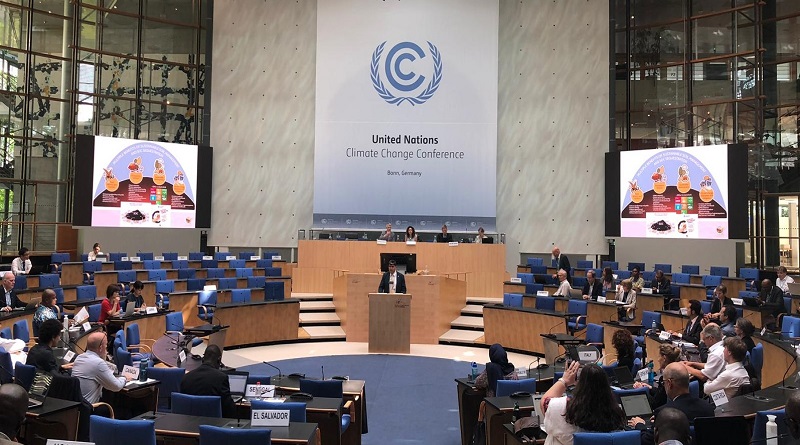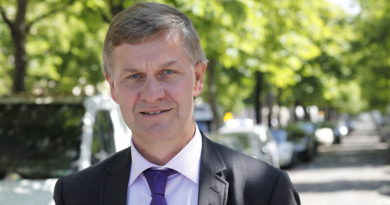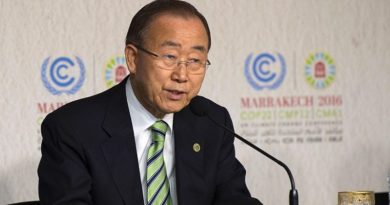Global Stocktake “must be the turning point” to limit warming
Delegates at the Bonn Climate Change Conference wrapped up the last meeting of the technical dialogue of the first global stocktake this week – laying the ground for more ambitious climate action.
“This is a critical year for climate action,” said UN Climate Change Executive Secretary Simon Stiell in an address to the dialogue. “The global stocktake at COP28 must be the turning point where we get on track to limiting warming to 1.5 degrees Celsius.”
The global stocktake is a two-year process for countries and stakeholders to see where they’re collectively making progress towards meeting the goals of the Paris Climate Change Agreement – and where they’re not.
It looks at everything related to where the world stands on climate action and support, identifying the gaps, and working together to chart a better course forward to accelerate climate action.
“The global stocktake is one of the most consequential processes that we are collectively engaged in this year,” said Nabeel Munir, Chair of the UNFCCC’s Subsidiary Body for Implementation. “The third and final meeting of the technical dialogue marks the end of the technical assessment phase of the first global stocktake. What you have been doing collectively is not only groundbreaking but also path-setting.”
At the Bonn Climate Conference, government delegates, observers and experts took part in the stocktake’s third and final technical dialogue, which was comprised of a series of roundtables and events spread across six days.
Participants discussed how to accelerate collective progress on mitigation, including response measures; adaptation, including loss and damage; and means of implementation (climate finance, technology transfer, and capacity building). They also showcased real-world examples of climate action being carried out in their countries or by their organizations.
“This technical dialogue has provided us with an important opportunity to bring forward options and tangible ways on how we can enhance our commitments and accelerate implementation at all levels,” said Harry Vreuls, Chair of the UNFCCC’s Subsidiary Body for Scientific and Technological Advice.
Many participants raised the need for greater ambition and underscored the urgency of implementation, in the light of equity and best available science. Participants also emphasized the urgent need for scale and speed in adaptation actions and adaptation finance, while also recognizing progress and the significant and ongoing domestic investments being made to enhance resilience.
“It is clear that we already have a deep and broad technical understanding of what it will take to course correct, and to rise to the challenges that are standing in the way of addressing the ambition and implementation gaps before us – across all topics,” said Farhan Akhtar, co-facilitator of the technical dialogue of the first global stocktake.
Despite progress in recent years, the world is not on track to meeting the goals of the Paris Agreement.
According to the UN’s Intergovernmental Panel on Climate Change (IPCC), global emissions need to be nearly halved by 2030 for the world to limit global temperature rise to 1.5°C. In addition, transformational adaptation is also needed to help communities and ecosystems cope with the climate impacts that are already occurring and are expected to intensify.
In March this year, the IPCC published its latest Synthesis Report, which summarizes all the scientific reports it has published during its sixth assessment cycle. The report highlighted just how far off-track the world is.
Speaking at the stocktake’s meeting in Bonn last week, IPCC Chair Hoesung Lee said it’s important to note that the report also contains a message of hope.
“The report stresses that urgent climate action can secure a livable future for all,” said Lee. “The report points to multiple, feasible and effective options across all sectors to reduce greenhouse gas emissions and adapt to human caused climate change. And those options for change are already available.”
What happens next?
The co-facilitators of the technical dialogue will prepare a summary report of the third and final technical dialogue, which will be published in August.
In early September, the co-facilitators will also publish a synthesis report, capturing the key findings of the three meetings of the dialogues. It will contain technical information, good practices and lessons learned to help Parties and non-Party stakeholders identify what to do to course-correct and achieve the Paris Agreement goals.
The first stocktake is scheduled to conclude at COP28, where the findings of the technical assessment will be presented, and their implications discussed and considered.
During the first week of COP28, the stocktake’s High-Level Committee will organize a series of high-level events. The committee will then summarize the events in a set of key political messages and recommendations, which are intended to inform Parties as they develop a decision to be adopted on the outcome of the global stocktake.
“Pledges by Parties and their implementation are far from enough,” said Stiell. “So, the response to the stocktake will determine our success – the success of COP28, and far more importantly, success in stabilizing our climate.”
Stocktake discussions will continue during the coming months to help prepare for COP28. For example, conversations are expected to continue during the Regional Climate Weeks, to ensure the outcome of the stocktake is as global and inclusive as possible. Information from work programmes and other events, such as the mitigation work programme and the global goal on adaptation, will also feed into the stocktake’s outcome.
A new online tool is now up and running that enables users to search the full text of all inputs to the global stocktake (more than 1,600 documents and 170,000 pages).




